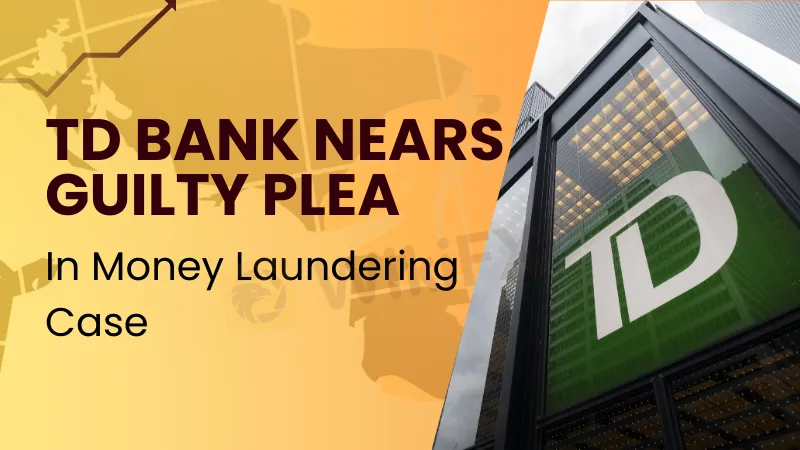简体中文
繁體中文
English
Pусский
日本語
ภาษาไทย
Tiếng Việt
Bahasa Indonesia
Español
हिन्दी
Filippiiniläinen
Français
Deutsch
Português
Türkçe
한국어
العربية
TD Bank Nears Guilty Plea in Money Laundering Case
Abstract:TD Bank is nearing a guilty plea over its US retail arm’s failure to prevent money laundering tied to illicit fentanyl sales. Learn more about the ongoing investigation.

TD Bank, Canada's second-largest lender, is allegedly close to entering a guilty plea in the United States on money laundering allegations. The probe comes from claims that TD's US retail business failed to block unlawful transactions linked to Chinese criminal organizations and fentanyl trafficking.
TD Bank Under US Federal Scrutiny
According to sources, US federal prosecutors are in discussions with TD Bank, and the bank's US retail unit is anticipated to reach a plea agreement within the next two weeks. The allegations underscore the bank's inability to establish appropriate anti-money laundering (AML) controls, notably regarding narcotics-related money laundering.
Authorities have claimed that the bank failed to maintain proper procedures to identify and prevent money laundering, allowing criminal gangs to siphon revenues from unlawful fentanyl sales. This is a big step forward in continuing regulatory attempts to address financial crime associated with the United States' opioid crisis.
Comprehensive Overhaul of AML Programs
In response to the attention, TD Bank stated in May that it was overhauling its anti-money laundering processes in the United States and worldwide. The bank disclosed an expenditure of more than C$500 million (US$400 million) in remediation activities, which included platform changes targeted at improving AML compliance.
The bank's reform came in response to mounting criticism from US and Canadian authorities alike. TD Bank had been investigated for compliance problems and had put aside more than $3 billion to handle legal difficulties stemming from the US government's investigations into its anti-money laundering policies.

Criminal Charges Rooted in Fentanyl Sales
Federal officials discovered a money-laundering scheme in New York and New Jersey, prompting the Department of Justice to launch the inquiry. The enterprise is accused of funneling hundreds of millions of dollars from unlawful fentanyl sales via TD Bank and other banking institutions.
The revelation sparked accusations that TD Bank was careless in its AML supervision, enabling illicit drug cash to flow through its networks unnoticed. The case emphasizes banks' vital role in preventing money laundering and the serious implications of failing to maintain adequate compliance systems.
Financial Institutional Implications
This case has far-reaching consequences for financial institutions operating in the United States and beyond. It emphasizes the need for strict anti-money laundering measures and the necessity for ongoing investment in compliance systems. Regulatory organizations, financial professionals, and legal experts are keeping a careful eye on the case, which might establish a precedent for future AML enforcement operations.
To avoid such failures, financial institutions, especially those operating across borders, are obliged to guarantee that their systems fulfill the highest regulatory compliance requirements. Failure to do so may result in substantial financial fines and reputational harm.
Conclusion
As TD Bank prepares to enter a guilty plea in the money laundering probe, the case serves as a sharp reminder of the continuing fight against financial crime. Regulators, financial professionals, and legal experts are expected to remain focused on this case in conversations about anti-money laundering compliance and enforcement.
Stay updated on TD Bank's money laundering case and its impact on financial institutions. Visit the WikiFX news page for the latest insights.

Disclaimer:
The views in this article only represent the author's personal views, and do not constitute investment advice on this platform. This platform does not guarantee the accuracy, completeness and timeliness of the information in the article, and will not be liable for any loss caused by the use of or reliance on the information in the article.
Read more

New Zealand's FMA Warns Against "YouTube Crypto Investment Scam"
The Financial Markets Authority (FMA), New Zealand's financial regulator, warns individuals against investment scams that use YouTube channels to promote fraudulent cryptocurrency investment firms/websites. The authority explained on its official website how the YouTube cryptocurrency scam works, providing a step-by-step guide to help people recognize and avoid it. Read HOW THE SCAM WORKS and BE SAFE.

How to Know if the Market is Correcting or Reversing?
In trading, distinguishing between a market correction and a market reversal is crucial for making sound decisions. Misjudging one for the other can lead to missed opportunities or significant losses. While both involve price movements, their causes, duration, and implications differ substantially. Understanding these differences can help traders improve their strategies and adapt to market conditions effectively.

RM62k Lost Investment Scam After Joining XRP Community Malaysia on Telegram
A 30-year-old homestay manager from Chendering, Malaysia, fell victim to an online bitcoin investment scam, losing RM62,214.59. According to Kuala Terengganu police chief ACP Azli Mohd Noor, the incident unfolded after the victim joined a Telegram group named “XRP Community Malaysia” on December 19. The group promoted bitcoin investments allegedly powered by Artificial Intelligence (AI).

Empowering the Next Generation in Finance with WikiFX: Gen Z’s Investment Journey
With a steadfast commitment to fostering sustainable financial literacy and providing clear, strategic guidance to the next generation, WikiFX has collaborated with Van Lang University and Hoa Sen University to host an exclusive series of financial education workshops. This marks a pioneering initiative by WikiFX in Vietnam, designed not only to deliver foundational knowledge but also to instill a sense of responsibility and cultivate prudent financial decision-making among aspiring young traders.
WikiFX Broker
Latest News
Two Californians Indicted for $22 Million Crypto and NFT Fraud
Macro Markets: Is It Worth Your Investment?
Trading is an Endless Journey
WikiFX Review: Is Ultima Markets Legit?
Colorado Duo Accused of $8M Investment Fraud Scheme
What Impact Does Japan’s Positive Output Gap Have on the Yen?
RM62k Lost Investment Scam After Joining XRP Community Malaysia on Telegram
Victims of Financial Fraud in France Suffer Annual Losses of at Least €500 Million
Malaysia Pioneers Zakat Payments with Cryptocurrencies
FCA's Warning to Brokers: Don't Ignore!
Currency Calculator


